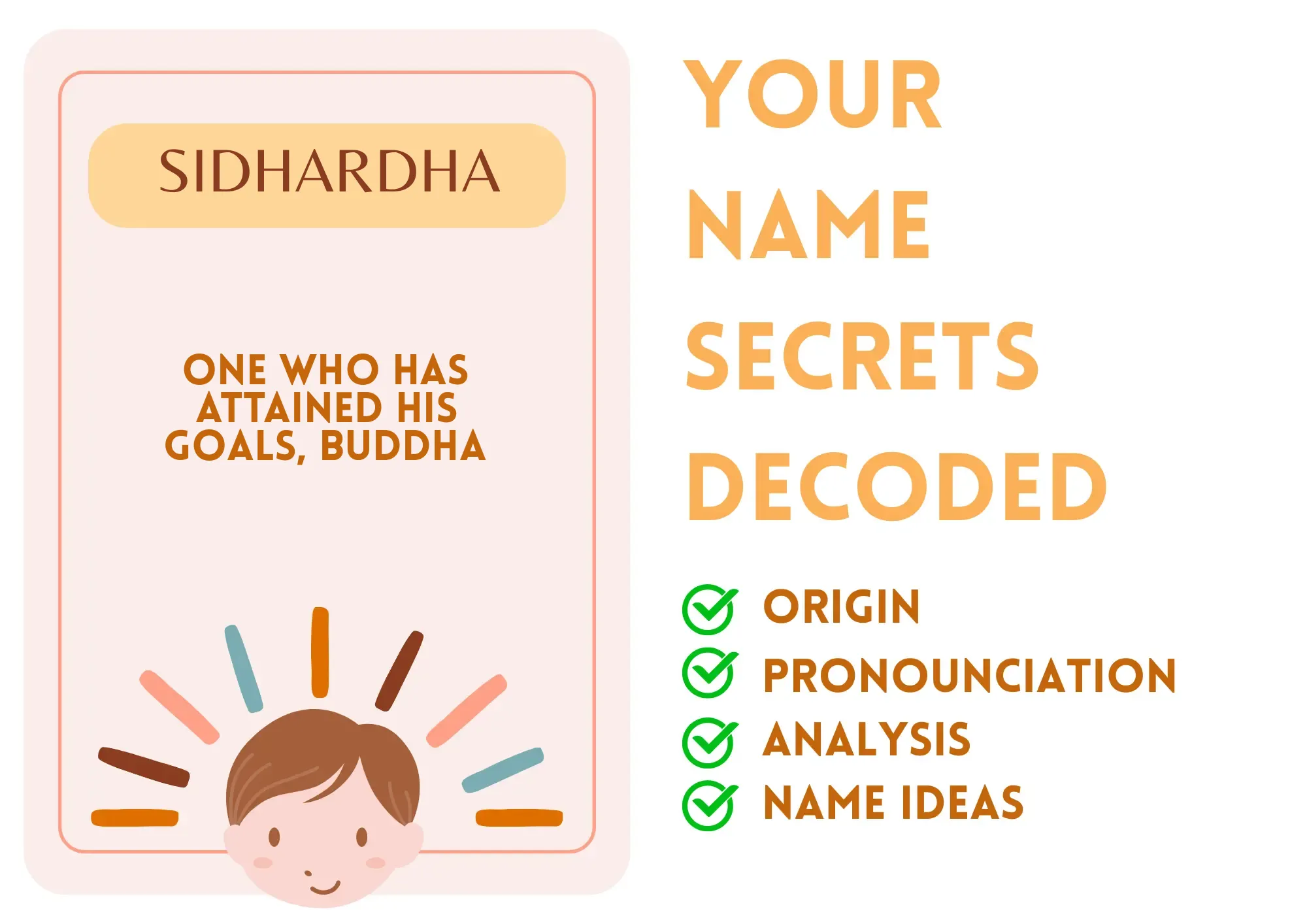
Sidhardha
Sidhardha is a name of profound significance, rooted in Sanskrit, meaning 'one who has attained his goals' or 'Buddha'. It is predominantly used in India and among Indian communities worldwide. Traditionally a masculine name, it carries deep connections to spirituality and enlightenment, resonating with followers of Buddhism and Hinduism alike.
The name signifies accomplishment and wisdom, often associated with the historical figure Siddhartha Gautama, who became the Buddha. This historical connection adds to its cultural weight, frequently representing values such as peace, enlightenment, and the pursuit of truth.
Sidhardha is generally received positively, evoking feelings of aspiration and spiritual depth. It is moderately easy to pronounce and write, though the 'DH' sound may be difficult for some non-native speakers. Common nicknames include Sid and Dhard.
The name Sidhardha is occasionally referenced in literature and spiritual discussions, particularly related to the Buddha's life. Parents often choose it for its aspirational qualities, wishing for their child to embody the attributes of wisdom and achievement.
Basic Information
Gender: Boy
Sounds Like: sih-DHAR-tha
Pronunciation Explanation: The emphasis falls on the second syllable 'DHAR', while the first syllable is pronounced 'sih' and the last syllable 'tha' is soft.
Summary and Meaning
Meaning: one who has attained his goals, Buddha
Origin: Sidhardha has Indian origins, derived from the Sanskrit language and closely connected to Hindu and Buddhist traditions.
Usage: Sidhardha is traditionally a masculine name, reflecting traits of wisdom and accomplishment.
Name Number (Chaldean)
Name Number (Pythagorean)
Popularity (Global Rank)
Overall: 162439
Boys:
Most Popular in
Religious and Cultural Significance
Religion: Buddhism
Background: Within Buddhist culture, Sidhardha references the historical Buddha, Siddhartha Gautama, symbolizing enlightenment, truth, and spiritual accomplishment.
Cultural Significance: Sidhardha is culturally significant due to its association with historical spiritual journeys and the ideals of aspiration and peace.
Historical Significance: Historically, Sidhardha is significant as it refers to Siddhartha Gautama, the person who attained enlightenment and became known as Buddha, offering a path to spiritual awakening.
Popular Culture
Literature and Mythology: The name appears in various texts and dialogues related to Buddhism, often discussing the journey towards enlightenment.
Movies and Television: Characters named Sidhardha or similar variations appear in films and television series exploring themes of enlightenment and spiritual growth.
Feelings and Perceptions
Perception: Sidhardha is generally viewed positively, associated with goals, wisdom, and spiritual aspiration. It evokes a sense of calm and depth.
Positive Feelings: Inspiring, wise, spiritually profound, aspirational.
Negative Feelings: Can be perceived as complex or difficult to pronounce correctly outside cultural contexts.
Practical Considerations
Ease of Writing and Calling: Sidhardha is somewhat complex due to the 'DH' sound but is manageable with practice. It consists of eight letters, which may be a bit longer than more common names.
Common Typos and Misspellings: Sidharth,Sidharta,Sidhardha,Sidhardha
Common Nicknames: Sid,Dhard,Sidh
Sidhardha Popularity
Sidhardha Usage and Popularity By Country
| Country | Rank (Overall) |
|---|---|
| India | 35139 |
| United Arab Emirates | 67985 |
| Australia | 105589 |
| Canada | 149654 |
| United Kingdom | 182431 |
| United States | 262335 |
Sidhardha Usage and Popularity By City
| City | Rank (Overall) |
|---|---|
| HyderÄbÄd | 10470 |
| Kakinada | 2315 |
| Chennai | 18943 |
| Guntur | 3209 |
| Bengaluru | 26501 |
| Visakhapatnam | 6315 |
| Jaipur | 7199 |
Compatibility Analysis
Famous Persons Named Sidhardha
No results found for Sidhardha.
Related Names
Similar Sounding Names:
Siddharth,Sidharth,Sita,Siddhi